Failing and scaling: 4 of BRAC’s latest failures — and biggest learnings
Each year, BRAC documents its biggest failures — and biggest learning opportunities — in a Failure Report. Each failure is a chance to learn, so we can tackle the world’s biggest problems.
BY SARAH ALLEN
BRAC is on a mission to reach 250 million people with proven poverty solutions by 2030. To achieve that ambitious goal, business as usual just won’t cut it.
The word ‘failure’ remains highly stigmatized, unless you’re with the team at BRAC’s Social Innovation Lab, our innovation hub in Dhaka, Bangladesh. Here, ‘failure’ is an inevitable step in the learning process. Without daring to fail, there is no chance for bold innovation or large-scale change. And innovation is in BRAC’s DNA.
The Social Innovation Lab produces an annual Failure Report, noting key lessons from projects that didn’t quite hit the mark. Read on to discover and learn.

1. Collective enterprises for returning migrant workers in Bangladesh
In Bangladesh, BRAC’s migration program helps foster safe migration for people looking to work abroad, and supports returnee migrant workers once they come home. Oftentimes, that support looks like helping returnee migrants become entrepreneurs and start small businesses.
In 2017, BRAC launched a five-year project to set up larger-scale, collective enterprises for groups of returning migrant workers. In each district, BRAC would help set up one larger enterprise where several returned migrant workers could collectively run and share profits, reaching a total of 3,000 returned migrants across the country.
However, challenges quickly emerged. In some regions, there were limited industry options for a larger business to break into the market, and the amount of capital invested in the project would not yield sufficient returns. Plus, legal regulations restricted the community enterprises to no more than 30 participants per business, limiting their chances for growth.
BRAC pivoted to set up one larger public limited company that could stretch across all of the districts and generate money from investments in the local economy, designating each of the 3,000 participants as shareholders. But many participants didn’t have the national ID documents they needed to become a shareholder. In the end, after BRAC made every effort to help participants obtain their documents, only 508 of the participants could obtain shares of the company.
The lesson?
Moving forward, BRAC will approach support for returnee migrants with a capacity-first approach: supporting skills development and capacity building and designing the program to meet participants where they are. Additionally, rather than going big on the first try, BRAC will start smaller: perhaps setting up businesses with five participants, and growing from there.

2. Collaboration across microfinance and clean water programs
BRAC’s water, sanitation, and hygiene (WASH) work increases access to clean water and promotes healthy practices like washing hands and using sanitary latrines. On a mission to increase access to safe water, BRAC’s WASH program collaborated with our microfinance branches to create a special WASH loan product.
The product would allow individuals to become water entrepreneurs. They would use loans to build a business filtering and selling water, particularly in communities where climate shocks have caused salt to contaminate clean water sources. This, on paper, would be a win for the community and help the entrepreneurs earn an income.
Field staff members set out for success. The WASH program team looked for people who were in need of clean water services. Meanwhile, microfinance field staff helped determine which people would be reliable clients who could set up businesses and eventually pay back a small loan. When these individuals overlapped, success seemed like a given.
Yet after a few months, the results were not promising. The teams had only disbursed a small fraction of the planned loans. In many cases, people who had been identified as strong candidates for the loans by the WASH team were not being approved as clients by the microfinance field offices.
While the WASH field organizers were adept at identifying households with the most need for water, they were not adept at identifying which people had the most capacity to take out a loan and build a successful business.
Once BRAC realized the challenge at hand, the microfinance team ran a tailored training to help WASH field organizers comprehensively assess prospective loan clients. Five training sessions with WASH staff resulted in an 80% increase in approved loans. As a result, more clean water entrepreneurs gained the tools to secure clean water for themselves and their communities.
The lesson?
Collaboration is key. When bridging aspects of more than one program, it’s critical to keep an open line of communication, and to establish a system for cross-learning. With those two ingredients, BRAC teams can maximize a program’s impact.

3. Launching a prototype with street vendors in Dhaka
Dhaka streets are lined with vendors selling everything from snacks and home goods, to goats. The informal street vendor economy is thriving. However, it represents a major challenge for urban planning: spilling onto roadways, these vendors contribute to pedestrian and vehicle traffic.
In 2022, BRAC sought to find a solution. Our urban development experts prototyped a model that would respond to the challenges that come with street vending, without interfering with street vendors’ livelihoods. Working directly with street vendors and the local government to develop a solution, we tested a legalization and regulation model that would help with traffic and planning.
The model was simple: street vendors at one major intersection would legally occupy parts of the footpath from 4pm to 10pm, five days per week. Beyond these times, the local government would work to provide alternate employment opportunities for the vendors.
However, as BRAC tested its pilot, challenges arose. BRAC was unable to stop the informal process of under-the-table ‘rent money’ that vendors have to pay powerful locals to operate. Although we had hoped that the legal framework and buy-in from the local government would be enough to squash these payments, it wasn’t enough to stop the informal payouts from happening.
Second, because the pilot was tested in such a small geographic area, other vendors just a few steps away were operating under the old, regulation-free system. Many vendors participating in the pilot decided to drop out, so that they could spend more hours of the week earning money.
The lesson?While we sought ideas and buy-in from street vendors, the incentive model was flawed. Plus, the pilot was tested in a busy, complex economic and political environment: one of the largest and busiest street vending hubs in Dhaka. As a result, it was challenging to change stakeholders’ sentiments and practices in the scope of a small pilot. Now, BRAC is working on another iteration of the pilot in a different context, starting smaller in a setting where we can be more nimble.

4. A disability-inclusive Graduation approach
BRAC’s flagship Ultra-Poor Graduation approach is a holistic, comprehensive approach that enables participants to lift themselves out of extreme poverty within two years. The model is well-researched and highly effective: More than 95% of participants ‘graduate’ out of extreme poverty by the end of the program, and graduates continue on an upward economic trajectory for 10+ years after the program. Developed in Bangladesh, the Graduation approach has been successfully adapted and tailored in many contexts around the world.
In 2021, BRAC set out to design a Graduation program specifically tailored for people living with disabilities. The program was piloted in four districts in Bangladesh in collaboration with Humanity & Inclusion, an organization that specializes in working alongside people with disabilities.
The team designed a set of interventions that included the traditional pillars of the Graduation approach, along with specific components like psychosocial support and rehabilitation for people with disabilities, as well as training for caregivers of people with disabilities.
But tailoring the approach for people with disabilities presented challenges: With such a diverse array of disabilities experienced by participants and members of their households, there was no “one-size-fits-all” approach. In some cases, traditional asset transfers were not appropriate for the participant, such as giving a participant with mobility challenges goats or cows to raise. Further, the traditional two-year timeline was not always sufficient: in many cases, it took a few months to fully understand each participant’s specific needs, provide psychosocial and rehabilitation support, and offer the best livelihood options based on their unique needs.
The lesson?
BRAC adapted its traditional Graduation approach. We made the timeline more flexible to understand and accommodate each participant’s unique needs, and to offer better-tailored psychosocial and rehabilitation supports, according to each participant’s disability.
Every year, BRAC fails. But we also resolve to do better: To innovate, learn, and iterate so that we can scale the most effective programs for the people who need them most.
Sarah Allen is Communications Manager at BRAC USA.
Story Statistics
2,345 Reads
80 Shares
320 Likes
Related Stories
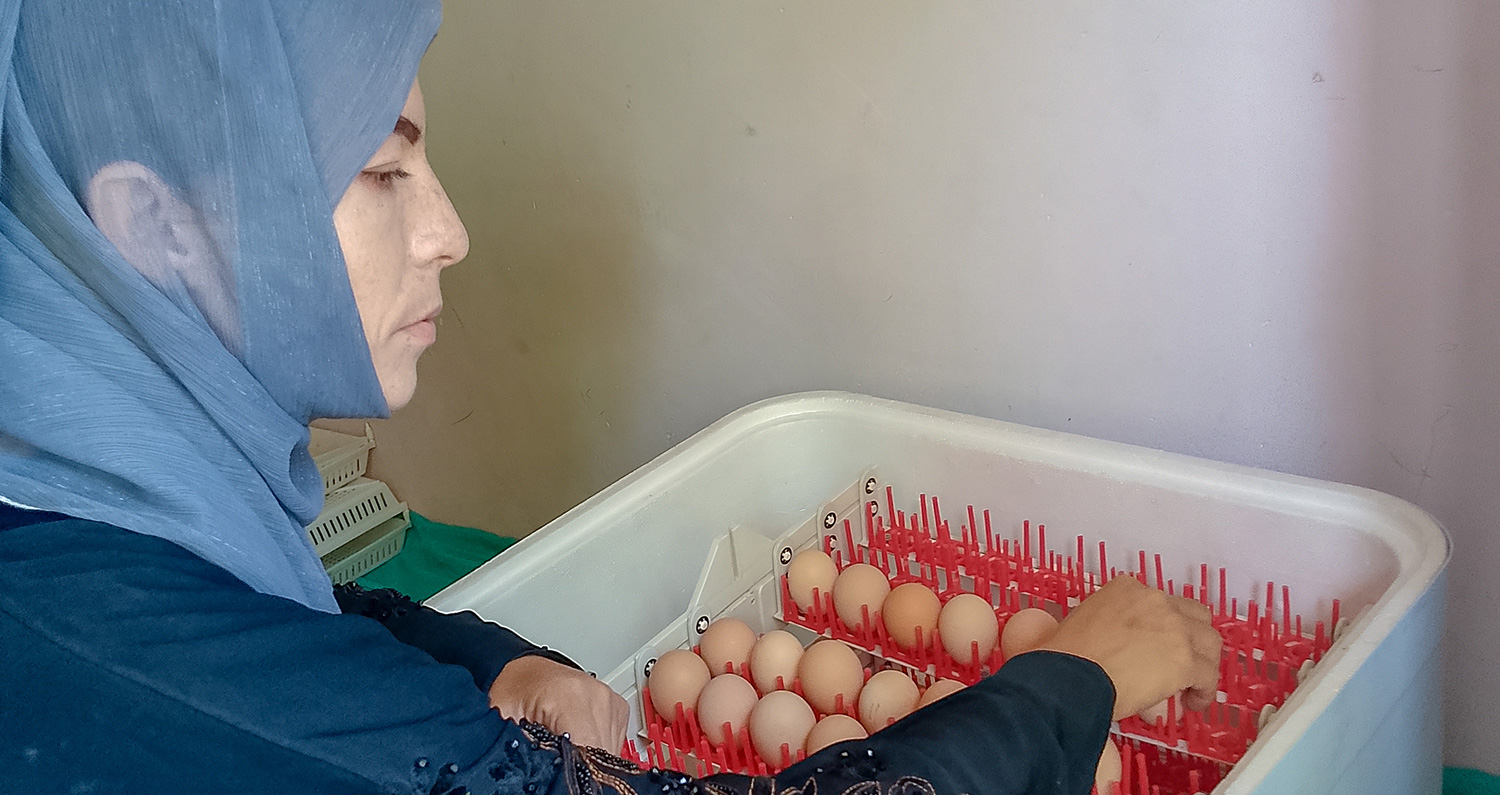
10 months ago
Incubating hope: Khadija’s story of resilience from Afghanistan
When 21-year old Khadija lost her father, her family lost everything. Two years later, she has built a thriving business raising chickens.
BY BRAC AFGHANISTAN
Two years ago, Khadija, a 21-year-old from the Dehdadi district of Afghanistan, faced a life-altering tragedy. The sudden loss of her father, the sole breadwinner of the family, left Khadija and her family helpless. As the oldest of three children, Khadija’s two younger brothers, aged 11 and 16, and her mother, were depending on her. With limited education and few opportunities in Afghanistan, Khadija felt the weight of her family’s future resting on her shoulders.
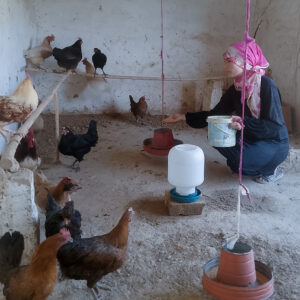 Desperate for a way to support her family, Khadija was determined. She sought help from neighbors and friends, but nothing resulted in a stable income for her family.
Desperate for a way to support her family, Khadija was determined. She sought help from neighbors and friends, but nothing resulted in a stable income for her family.
In October 2022, a glimmer of hope arrived when BRAC launched a livelihood project in Afghanistan and invited Khadija to participate. Through a comprehensive 36-day training program, she learned how to rear chickens and use an incubator to help eggs hatch. The training helped Khadija build her technical skills, expand her knowledge, and boost her confidence.
After the training, Khadija received an incubator, a battery, solar panels, wiring, a lamp, switches, feeding and water bowls, chick feed, and $1160 in cash to help launch her own poultry farming venture. Equipped with these resources, Khadija embarked on her journey as an entrepreneur raising chickens.
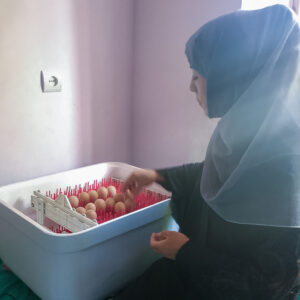 Khadija’s incubator, with a capacity for 96 eggs, has yielded an excellent success rate: She hatches an average of 90 chickens in a cycle, which typically takes around 36 to 40 days. Since launching her business, Khadija has raised nine cycles of chickens: more than 800 chickens in about a year. She sells about 60 chickens per cycle, earning her a net income of 3500-4000 Afghani (approximately $50 USD) per cycle.
Khadija’s incubator, with a capacity for 96 eggs, has yielded an excellent success rate: She hatches an average of 90 chickens in a cycle, which typically takes around 36 to 40 days. Since launching her business, Khadija has raised nine cycles of chickens: more than 800 chickens in about a year. She sells about 60 chickens per cycle, earning her a net income of 3500-4000 Afghani (approximately $50 USD) per cycle.
Khadija raises the remaining chickens herself, providing her family with a steady supply of eggs and a critical source of protein. Her chickens produce at least a dozen eggs daily, and after setting aside a few eggs for her family’s consumption, she sells her surplus at the local market. She sells 8-11 eggs per day for around 8 Afghani ($0.11) each, further boosting her income.
From having nothing to building a thriving business at the age of 23, Khadija’s transformation is truly inspirational. With her hard-earned money, Khadija is successfully supporting her family as its primary breadwinner, enabling her to purchase items like carpets and kitchen tools for their home.
Khadija now dreams of expanding her poultry business, aspiring to greater success and a lasting impact on her family’s future. She is determined to continue her journey of resilience. From a place of despair, she has transformed into a pillar of strength for her family, lighting the path to a promising future.
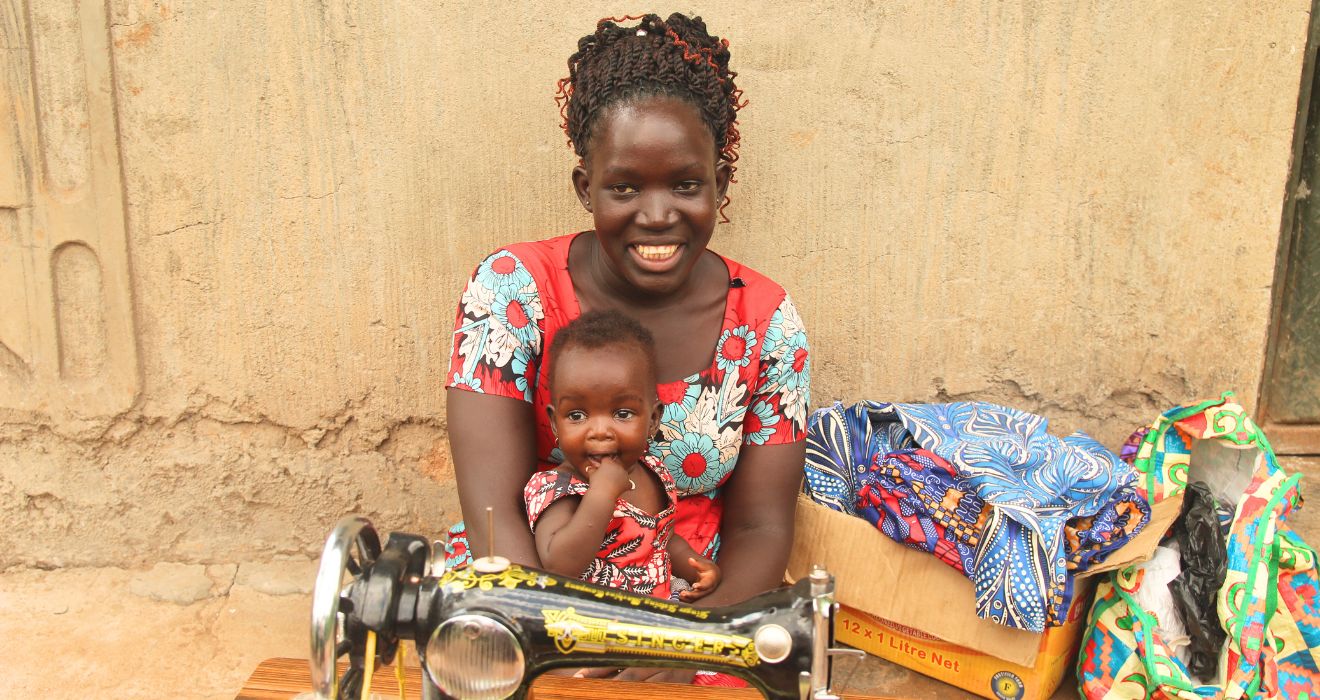
10 months ago
World Youth Skills Day: Lonah stitches skills for a new future
Lonah is one of thousands of girls in Uganda who are gaining business, livelihood, and life skills. On World Youth Skills Day, discover how she’s using these new skills to build a business and rewrite her future.
BY SARAH ALLEN
 At just 21 years old, Lonah is a mother, small business owner, and the breadwinner of her family. Her family of three — herself, her spouse, and her baby, Verena, just seven months old — lives in Luwero, Uganda, where they rent a modest home.
At just 21 years old, Lonah is a mother, small business owner, and the breadwinner of her family. Her family of three — herself, her spouse, and her baby, Verena, just seven months old — lives in Luwero, Uganda, where they rent a modest home.
Lonah moved to Luwero from northern Uganda in late 2020, and when she first arrived, she felt isolated. As an outsider coming to a new place amid a pandemic, she didn’t have any friends in her community.
She also had no income of her own: she primarily spent her time caring for the home, while her husband sold pineapples in the local market.
But last year, everything changed when she joined a youth empowerment club with other young women in her community.
“My friends almost doubled!” she shared gleefully. Lonah made many new friends and, importantly, gained a community of young women her age facing similar experiences.
Each Friday at 3:00, Lonah would walk to the clubhouse in her community, just a few steps away from her home. At the time, she was already pregnant with Verena.
The club became a safe space for Lonah amid her peers and a near-peer mentor, many of whom were pregnant or had young children, too. They sang songs, danced, socialized, and learned about critical topics like sexual and reproductive health and gender rights.
“There are teachings as women that we are usually told. But in the clubs, we learned all about topics like family planning, balanced diets, and child abuse.”

The girls also learned about budgeting, saving, and entrepreneurship. Lonah, who had always been interested in fashion, was interested in becoming a tailor: so BRAC connected her with a vocational training program to learn sewing. She also gained a critical tool to launch her business.
“I got this sewing machine here from BRAC; something I never imagined getting in my life,” she shared while beaming at her prized possession.
Lonah is just one of over 70,000 girls who participated in the program last year — Mastercard Foundation Accelerating Impact for Young Women (AIM) in partnership with BRAC — and this year, another 200,000 girls joined her. By the program’s end, nearly a million more adolescent girls and young women ages 12-34 will gain life skills and age-appropriate entrepreneurship and employment opportunities.
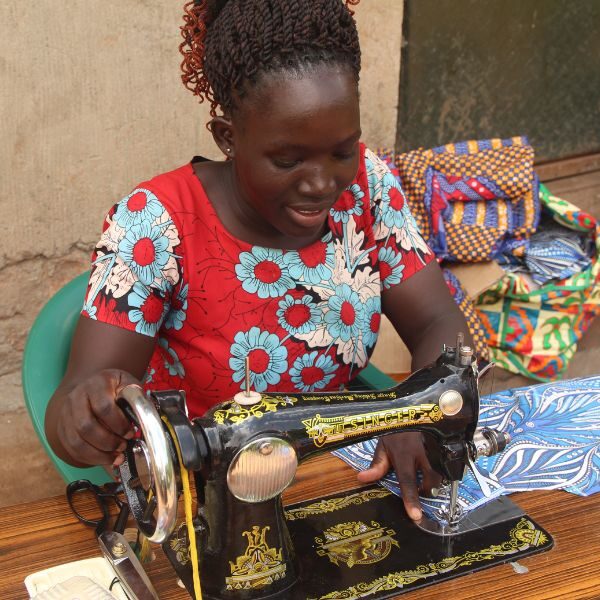 Since participating in the tailoring training, Lonah’s business has taken off. She has begun to attract more customers, and she is receiving plenty of custom orders. Her tailoring business has become her family’s main source of income.
Since participating in the tailoring training, Lonah’s business has taken off. She has begun to attract more customers, and she is receiving plenty of custom orders. Her tailoring business has become her family’s main source of income.
“My quality of life has changed. I am also saving even more than I used to save last year.”
Lonah’s family is no longer on a restrictive diet: They can buy all the nutritious food they need. “Before, I used to buy smaller food, which my family shared once a day. Now, sometimes I eat and I almost feel like dying because I am so full!”
Running a business while caring for her household and family is challenging: Lonah’s long day starts with caring for her daughter and preparing food for breakfast and lunch while her husband goes to work. Then she pulls out her sewing machine. On a typical day, she sews clothes until dinner time, making about three children’s dresses or one and a half shirts or dresses for adults. Finally, she prepares dinner, cleans the home, bathes her daughter, and puts her to bed.
Lonah describes herself as a people pleaser: She loves to do things for others, including her family and friends. “I am working so hard so that I can have my own home and so that my child can be happy.”
But she still makes time for fun: “Once everything is done at work, if I want to be happy, I like to go and visit friends and we love to eat, drink, and have fun together.”

Lonah is determined to expand her business. One challenge she’s facing as a new business owner is limited capital. So far, she has completely bootstrapped her business without significant investment capital beyond the money she has diligently saved.
But as her business grows, her needs are changing. Sometimes, when customers come to place an order, she does not have the color of fabric they want in stock, but she has already invested her money into other fabrics. She is excited to take a loan from BRAC’s affordable microloan offerings so that she can stock more fabrics, attract more customers, and take on more orders.
Lonah also wants to rent a larger home or a separate room to accommodate her growing business. Currently, she sews right outside of her rented home, because there’s not enough space inside for her to sew with her machine. When the sun is hot or the rain is pouring, she is forced to work through it, or lose out on valuable hours of work.

She dreams of having a storefront where customers can all come in and shop, and where she can work indoors no matter the weather. She’s already a fashion designer, but she wants to continue allowing her creativity to flourish and become a fashion inspiration for others. “I want to be a fashion designer, so that I can even dress brides and grooms!”
Although Lonah and her peers have graduated from their local AIM club, she continues to keep in touch with the girls who have become her closest friends. Her business is continuing to expand, and Lonah continues to set aside more money each week to save for her goals. She has even doubled her savings rate since graduating from the AIM program!

“I want to keep some money so that when my daughter starts going to school, I have the money,” Lonah said. “I also don’t want to be renting: I want to build a home for my family by the time she starts school.”
Lonah is well on track to achieve her dreams.
Sarah Allen is Communications Manager at BRAC USA.
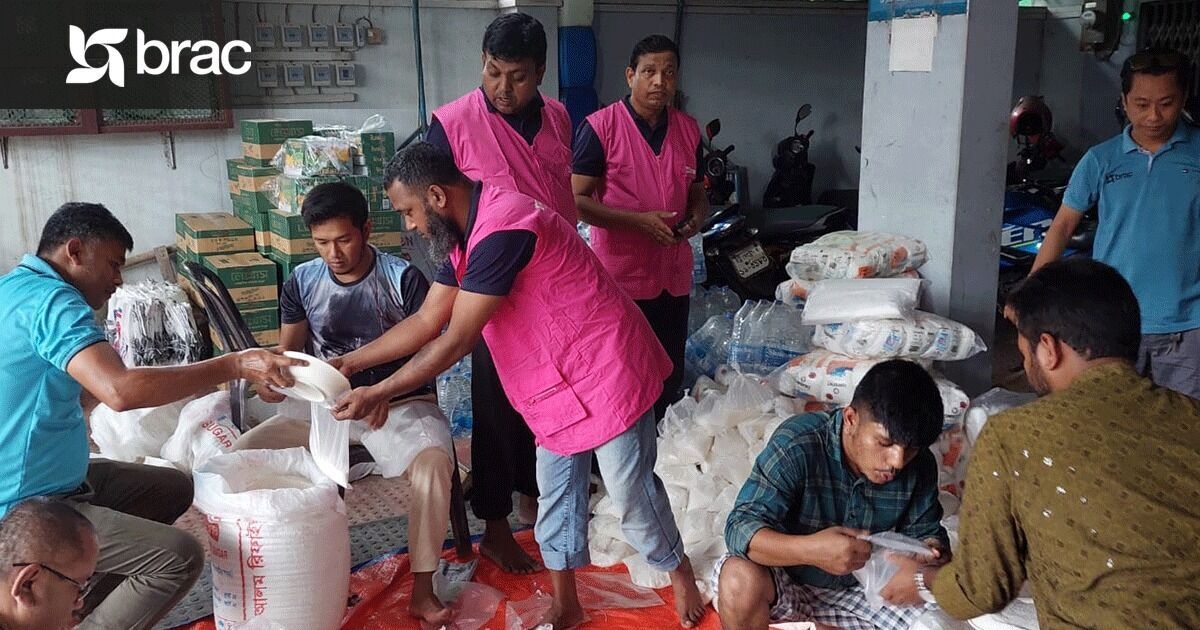
10 months ago
BRAC responds as catastrophic floods strike Bangladesh
BRAC teams are responding to support families impacted by catastrophic flooding in Bangladesh.
BY MICA BEVINGTON
In Hathazari, Chattogram, in southern Bangladesh, emergency relief teams are shoulder to shoulder, preparing relief kits for 500 families trapped by floodwaters. The families are sheltering in nearby buildings, including schools.
Bangladesh has been hit by a catastrophic disaster.
BRAC has deployed 5,000 field staff in response to some of the worst flooding in the country’s history. Teams are encountering acute needs amid floods that stretch dangerously across 11 districts. At least 15 people have lost their lives, and almost 900,000 families are reported to be trapped by floodwaters.
People need help evacuating to safe places, and temporary shelter items, such as tents. Other needs include dry food and drinking water, medical support, menstrual hygiene kits, water purification tablets, and food for livestock.
“In the past 38 years, the people of this region have never faced such catastrophic flooding, nor witnessed floodwaters rising to these unprecedented levels,” says Khondoker Tawhid, Program Head of BRAC’s Disaster Risk Management Program. “Thousands of individuals in remote and inaccessible areas remain stranded, many of them forced to seek refuge on the rooftops of their homes. The urgent priority is to evacuate these individuals to safe shelters and provide them with essential food and water. However, our field teams are encountering significant obstacles in communicating with flood victims and delivering aid, as road networks are entirely submerged, electricity has been cut off, mobile networks are disrupted, and there is a shortage of boats.”
In Khagrachari, BRAC is taking boats house to house, delivering food, safe water and essential medicines.
“The weather forecast for Feni shows the situation is hopefully going to improve — but even if it does, the need for longer-term recovery and rehabilitation is going to be massive,” Asif Saleh, Executive Director of BRAC Bangladesh, wrote on LinkedIn. “Bangladesh will need to stand united.”
BRAC offices have been inundated with water. Twenty offices, and six informal education centers are damaged.
Tawhid’s teams are undeterred. He says, “Despite these critical challenges, we are committed to providing lifesaving support — distributing dry and cooked food, water, and other essentials to those we can reach. To date, we have provided assistance to over 9,000 families with food and water. Our efforts will continue, focusing on food distribution, shelter reconstruction, water and sanitation initiatives, and livelihood restoration as soon as conditions allow.”
BRAC has released approximately $250,000 of its emergency reserve funding to power the first phase of its response. So far, teams have distributed 8,500 packets of dry food, and are working on ways to support medium and long-term rehabilitation efforts for those affected.
Global appeal for donations
BRAC has launched a global appeal for donations to support families as they navigate the crisis. Make your secure online gift to support people in need today. Donors based in Bangladesh can make donations here.
- $20 can support a family’s most basic needs for two weeks.
- $635 will help a family rebuild their house.
- $340 will help repair a damaged tube well.
- $340 will aid the reconstruction of a latrine.
Mica Bevington is Director of Communications at BRAC USA.
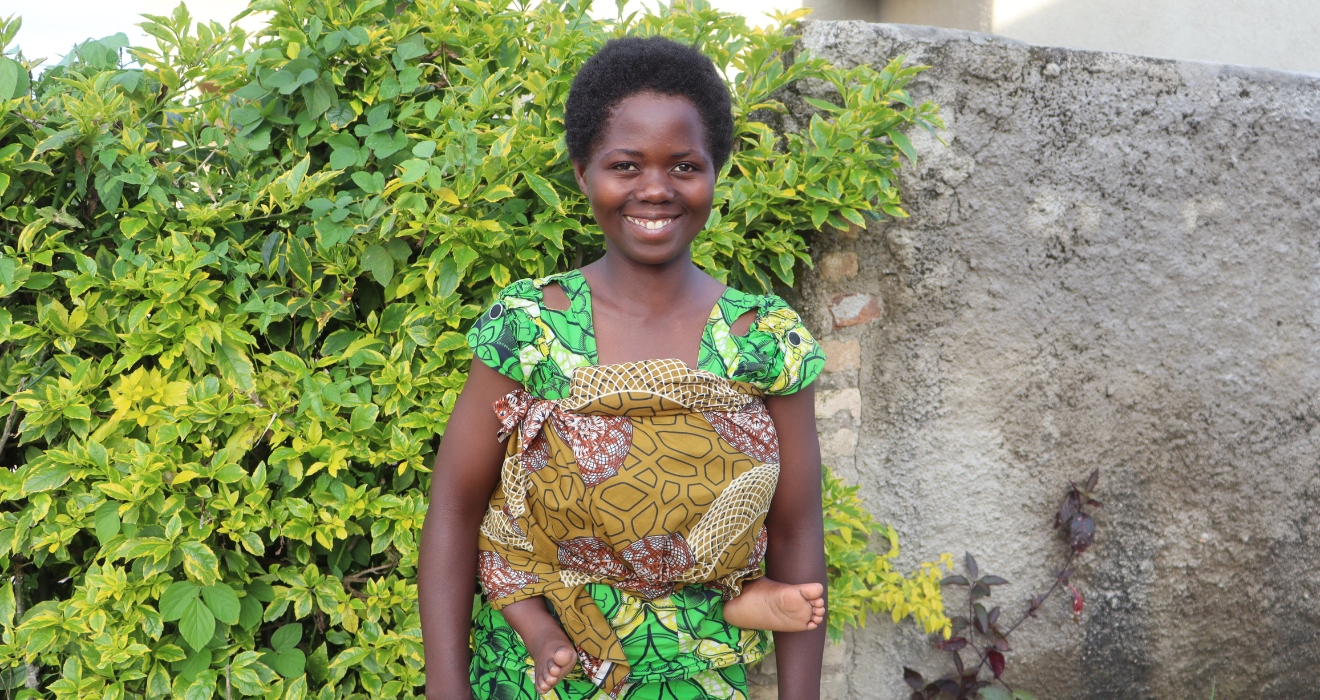
10 months ago
International Youth Day: Angelique finds her stride in Rwanda
As we celebrate International Youth Day — a day dedicated to the boundless potential of young people — we turn the spotlight on Angelique, who is building friendships and planning for a brighter future in Rwanda.
BY MEGHAN MCLAUGHLIN
Originally from Rwanda’s Eastern Province, 24-year-old Angelique moved to the Southern Province with her husband, Francois, and their two-year-old daughter, Scovia, in search of new beginnings.
Angelique hoped this new start would open doors for her family. When Angelique was young, her path was filled with challenges. She had to drop out of secondary school due to financial hardships. Without health insurance, she couldn’t access the care she needed when she fell ill.
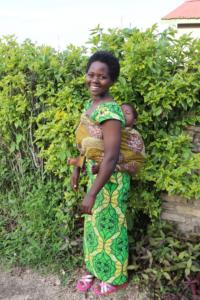 Despite taking on jobs as a casual laborer, Angelique struggled to make ends meet, and financial independence seemed out of reach. With no steady income or family and friends nearby for support, she felt isolated and increasingly uncertain about her future.
Despite taking on jobs as a casual laborer, Angelique struggled to make ends meet, and financial independence seemed out of reach. With no steady income or family and friends nearby for support, she felt isolated and increasingly uncertain about her future.
Everything changed when she joined her local youth empowerment club through Mastercard Foundation Accelerating Impact for Young Women in partnership with BRAC (AIM). Here, Angelique learned the value of saving and gained access to financial resources. She now earns around 1,000 Rwandan Francs from casual work and saves 200 Francs each week in her local village savings group.
“I always had to ask my husband for money, even to buy salt,” she recalls. “I didn’t know about savings, but now I save a portion of my earnings,” she says, beaming with pride.
The club also taught Angelique about family planning and preparing for the future, helping her focus on her daughter’s education and better living conditions. The most transformative aspect was the sense of community she found with friends and a mentor who share similar challenges. Now she has a support network of young women.
 When I asked Angelique if she wanted to take a photo with a friend from the club, she enthusiastically reached for her mentor and AIM club leader.
When I asked Angelique if she wanted to take a photo with a friend from the club, she enthusiastically reached for her mentor and AIM club leader.
With newfound independence and self-esteem, Angelique has big ambitions. She dreams of starting her own business, raising livestock, and ultimately building a home. “Now I have goals and a vision for my future,” she says. “I feel able, like I can.”
Angelique’s participation in her local youth empowerment club has been life-changing. The social interactions and knowledge she has gained have been invaluable. “I love socializing and the savings group activities. Learning to save money makes me proud,” she notes.
 Members of Angelique’s AIM club proudly show that empowered women are strong women.
Members of Angelique’s AIM club proudly show that empowered women are strong women.
Angelique’s journey is a testament to the incredible potential that lies within young people across the Global South. BRAC’s youth empowerment programs, which combine social and economic empowerment with education, are crucial in helping individuals like Angelique overcome barriers and achieve their dreams. As she looks ahead to the possibility of small loans to start her business, Angelique embodies the spirit of International Youth Day—celebrating the power and promise of youth.
Having completed the first phase of the AIM program — social empowerment — Angelique is now poised to begin the next chapter: economic empowerment. We can’t wait to see where her journey takes her next!
Meghan McLaughlin is Senior Manager, Digital Marketing at BRAC USA.

10 months ago
“Catastrophic” Bangladesh floods
BRAC teams are responding to support families impacted by catastrophic flooding in Bangladesh.
BY MICA BEVINGTON
In Hathazari, Chattogram, in southern Bangladesh, emergency relief teams are shoulder to shoulder, preparing relief kits for 500 families trapped by floodwaters. The families are sheltering in nearby buildings, including schools.
Bangladesh has been hit by a catastrophic disaster.
BRAC has deployed 5,000 field staff in response to some of the worst flooding in the country’s history. Teams are encountering acute needs amid floods that stretch dangerously across 11 districts. At least 15 people have lost their lives, and almost 900,000 families are reported to be trapped by floodwaters.
People need help evacuating to safe places, and temporary shelter items, such as tents. Other needs include dry food and drinking water, medical support, menstrual hygiene kits, water purification tablets, and food for livestock.
“In the past 38 years, the people of this region have never faced such catastrophic flooding, nor witnessed floodwaters rising to these unprecedented levels,” says Khondoker Tawhid, Program Head of BRAC’s Disaster Risk Management Program. “Thousands of individuals in remote and inaccessible areas remain stranded, many of them forced to seek refuge on the rooftops of their homes. The urgent priority is to evacuate these individuals to safe shelters and provide them with essential food and water. However, our field teams are encountering significant obstacles in communicating with flood victims and delivering aid, as road networks are entirely submerged, electricity has been cut off, mobile networks are disrupted, and there is a shortage of boats.”
In Khagrachari, BRAC is taking boats house to house, delivering food, safe water and essential medicines.
“The weather forecast for Feni shows the situation is hopefully going to improve — but even if it does, the need for longer-term recovery and rehabilitation is going to be massive,” Asif Saleh, Executive Director of BRAC Bangladesh, wrote on LinkedIn. “Bangladesh will need to stand united.”
BRAC offices have been inundated with water. Twenty offices, and six informal education centers are damaged.
Tawhid’s teams are undeterred. He says, “Despite these critical challenges, we are committed to providing lifesaving support — distributing dry and cooked food, water, and other essentials to those we can reach. To date, we have provided assistance to over 9,000 families with food and water. Our efforts will continue, focusing on food distribution, shelter reconstruction, water and sanitation initiatives, and livelihood restoration as soon as conditions allow.”
BRAC has released approximately $250,000 of its emergency reserve funding to power the first phase of its response. So far, teams have distributed 8,500 packets of dry food, and are working on ways to support medium and long-term rehabilitation efforts for those affected.
Global appeal for donations
BRAC has launched a global appeal for donations to support families as they navigate the crisis. Make your secure online gift to support people in need today. Donors based in Bangladesh can make donations here.
- $20 can support a family’s most basic needs for two weeks.
- $635 will help a family rebuild their house.
- $340 will help repair a damaged tube well.
- $340 will aid the reconstruction of a latrine.
Mica Bevington is Director of Communications at BRAC USA.
